The pancakes are ready. That’s what I heard Jimmy say to the girls when we heard a knock on the front door. It was a Tuesday in March of 2021 and the sun was shining into our big kitchen window. If you sat in the wrong chair, you’d have to squint while you buttered and syruped your pancakes, sipped your coffee. Spring is a coin toss in the Pacific Northwest and so far, this was a bright and warm one in Portland. Music was playing, though I couldn’t tell you what. Shortly after the knock, we paused the music. Bad news usually comes on good days.
Our neighbor was at the front door with her dog. She had walked by the sixteen-foot storage pod in our driveway behind the house and noticed that the two padlocks had been sliced cleanly off. She just thought she’d mention it in case we hadn’t been outside yet. We had not. Though for a second, I clung to an irrational hope that Jim had; that this was just some elaborate prank or his whacky version of padlock diversion quality control. It was not.
There were two sixteen-foot pods on our property so this one contained approximately half our stuff. This particular pod was 24 hours away from being picked up and transported across the country. We were leaving Portland - reluctantly, bittersweetly, ambivalently. After almost 15 years on the west coast, we decided to move back to New England. I don’t know how one comes to make these decisions and I still don’t. I know what I say. When people asked me why we were moving I got used to rattling off boring, on-paper reasons. We want to be closer to family, better school system, a house with a guest room? (We didn’t end up with a guest room). And then I’d sort of trail off...like, I don’t know, man, you tell me? How do you decide to stay or go?
I’m familiar with not having a clear answer to questions like these. I’m not really from anywhere which is to say I’m a little bit from everywhere. By the time I was in 8th grade, I’d lived in 5 states, 8 houses. At almost 15 years, Portland was the longest I had ever stayed in one place. What that came to signify was something I was only beginning to grapple with upon leaving. I had learned how to stay. I’d banked comfort and confidence in putting down roots. I had a community of friends, neighbors, and support. I was beginning to have professional peers. And maybe most importantly, I felt deeply familiar with the pulse of the city. I felt like I belonged somewhere. I knew it’s rhythms and quirks; I’d seen it change rapidly in the time I was there. It is not perfect, nowhere is. But I loved it dearly and leaving our corner of North Portland still hurts, though less and less.
When we decided to move to Portland, it was for adventure. It was 2006 and we were young and didn’t have kids. We realized we could go anywhere. And that’s what we said to people. That’s what our on-paper reasons looked like then - we want to try something new, we’re sick of the DC traffic, tired of the grind and long hours. There are always secondary reasons. The reasons behind the reasons that you tell close friends over drinks. From the outside, I’m sure it seemed a little crazy. We were relatively new to each other, overconfident in our young relationship and neither of us that far out of old relationships. Perhaps not as far out as we’d care to admit to ourselves or each other. Our relationship had reached an intersection and we had to decide to stay or go.
In short, we escaped.
We left both our East Coast families. We imagined Portland as a place that was lighter, breezier, the vibe more akin to who we were. We fell in love with the idea of being alone together, of nurturing our relationship in a new world. It was a fast-track test to see if our relationship would sink or swim. I had a romanticized idea of Portland, though I don’t know where I’d even gotten it. I’d never been there but I felt drawn to the west coast. I sensed that something in me would feel matched by something out there. Maybe I would feel seen. Maybe I would be found.
We flew out for 48 hours in October of 2006. It rained the whole time, and Jimmy got a bout of terrible food poisoning that kept him in the hotel bathroom for most of the trip. He pulled it together to go interview at the hospital on the hill and I interviewed at a few grad schools. He got the job and I got into grad school. By January we’d landed in a downtown apartment we’d found on Craigslist, sight unseen. Let the adventures begin.
We didn’t take advantage of the right stuff. I’ve never skied on Mount Hood or camped along the coast. We’d hit Multnomah Falls like tourists when family came out to visit. It is a beautiful place to live, and I knew that, but I didn’t bask in it the way the outdoorsy people did. We drank our weight in coffee and spent a lot of time in bookstores and music venues. We got good at eating in amazing restaurants. I fell in love with Pacific Standard Time. The ability to answer emails and texts late at night while the east coast slept? Glorious. You haven’t lived until you’ve watched the Oscars at 5pm or game 7 of the Eastern Conference Finals and can tuck yourself in by 9:30. And music! The thrill of queueing up the first few minutes of a new album at 9:01pm on Thursday night. Bliss. Also - no sales tax, baby.
Oregon is not without its drawbacks. Most of us Portlanders know where we were when the big one dropped. The day The New Yorker published Kathryn Shulz’s “The Really Big One: An earthquake will destroy a sizable portion of the coastal Northwest. The question is when.” It was July 2015 and I was a couple months postpartum. I was, in retrospect, not doing that well. Diana was not eating and went weeks with an undiagnosed lip and tongue tie. June was not thrilled with her new sibling and finding new ways to express it to us. We were sleep-deprived and anxious. We were not in an optimal state to read this piece.
For weeks after I read it, I would pace and cry and beg Jimmy to start packing. We had to leave, it felt urgent. It felt like a choice between literal life and literal death. Several times a day, I’d hold perfectly still and brace myself; convinced it was coming any second. Over time, I’d willed myself to calm down and I simply just started to forget. Eventually it didn’t amp me up as much, and he and I would talk calmly and make plans about how to get to each other, just in case. He worked on the other side of the river from where we lived and surely all the bridges would go out. So, we stocked some water and canned goods, bought walkie-talkies and packed go-bags. But the months and years passed and mostly the threat faded. We lived our privileged, little lives.
Slowly, the scales began to tip. The pandemic hit and we didn’t see family for over two years. The girls did virtual school for a year and half. What had once felt like an affirmative cheer – YES, PORTLAND IS OUR HOME – now felt like a wavering whisper. We were truly ambivalent, but we moved forward. We reversed the process from all those years before. Now he interviewed at hospitals in New England and things clicked into place. Our house sold easily, the girls could finish the school year and begin fresh on the east coast in 1st and 6th grade.
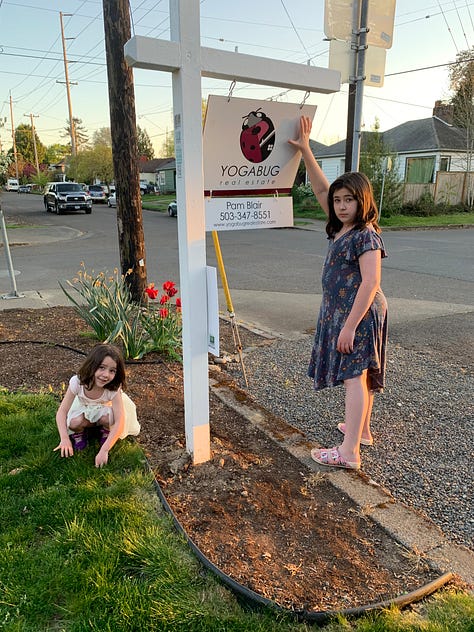
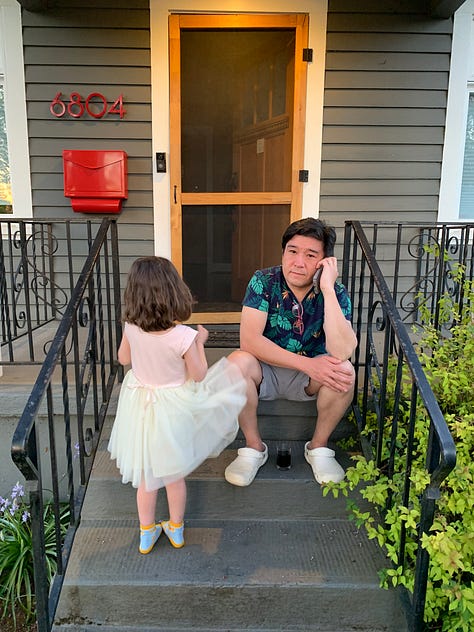
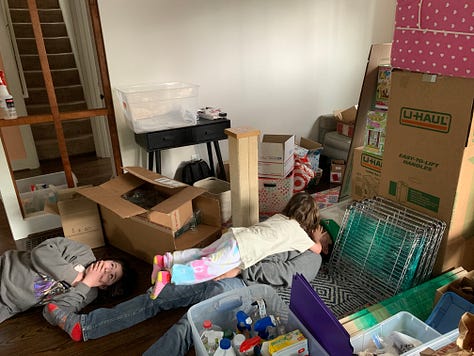
But first, we must catalogue our losses. We go out to the pod on that Tuesday in March and realize it’s been picked over and ransacked. There is big stuff gone we identify immediately - bicycles, Jimmy’s childhood camping gear, a laptop and hard drives, glassware and small kitchen appliances, a whisky collection, fancy wedding gifts from years ago. And yet worse than all that, boxes and boxes of sentimental things – my daughter’s journals, photographs, notebooks, schoolwork and projects. Possessions that are worth absolutely nothing, but to us they’re priceless. For weeks afterward, I’d imagine their little faces smiling up from school photographs on the side of the road.
The whole thing began to feel like an obvious and clunky metaphor. The insurance company wanted proof of everything; receipts or photographs of us holding a wine glass or using a food processor from a decade ago. We were forced to inventory our entire time out there, to take stock of what we had and what we lost and how much it was worth. But what was more haunting, more apt was trying to calculate what we didn’t know we had lost. For weeks afterward, an image would pop into our heads, and we’d shout across rooms to each other. Oh yeah, the nice milk frother is gone too!1 Imagine boxing up half your things and then from memory, reciting them all.
But in what is perhaps the most poignant aspect, we wouldn’t know everything we’d lost and deeply miss until we landed on the other coast. The pod left the next day. We left in June and bounced around rentals, finally moving into our new home in September. We couldn’t tell you what our life there was worth until we left, until we started someplace new. We cried for days as we said goodbye to people. Hold onto this moment. I tried to savor all of it.
I didn’t know it yet, but the most devastating loss for me wouldn’t come for another 3 years. In 2024 I realized I hadn’t seen this particular photo album in a while. It’s one I put together in high school of my parents, my childhood. It’s filled with original one-off prints and polaroids. I hauled that heavy, fake-leather thing everywhere. I’d flip through it my freshman year in college when I was homesick. It took me 3 years in our new home here to face the nagging whisper in my gut that it wasn’t on the bookshelf, I hadn’t seen it in passing out of my peripheral vision . It was easier to convince myself it was probably in that garage bin, those boxes under the stairs. I eventually tore the house apart and confirmed what I already knew.
Now, I don’t live there anymore. Now, I have the embarrassing2 task of saying I live in Connecticut. A place I lived from 8th-12th grade. A place I’d swore I would never return to. A place that always felt like it was in between something good and something better; a limbo you pass through to get to Boston or New York or back again. It wasn’t until I went to college in the Midwest that I learned how other parts of the country viewed the Nutmeg State. I’d say Connecticut and people pictured Martha Stewart and Gilmore Girls. Naively, I didn’t even know a place like that existed at the time. I came from a gray town just east of Hartford. It was not glamorous. There was nothing “wrong” with it per se. But I didn’t have particularly great memories of living in the 4 homes in 5 years there. Now I’m trying to make new ones. I’m trying make myself over again.
I am not good at being grateful for what I already have. I know this about myself. Of course, even in Portland I had moments, days, weeks of yearning for other things. The daily struggle of staying present. (No hopes, no fears, ha.) I am often hurling myself into the past or projecting myself into the future. I’m better now at making friends with that unease in myself. I’ve come to recognize that when I am in one place, I may always want to be in another. No feeling is final, as I often remind the girls - it is not necessarily of the present place. Four years into this stint of CT and bittersweetly, I miss Portland less and less. I like our life here. Who’da thunk.
The last night we spent in our Portland house we went into the backyard with four little statues we’d all picked out. We dug a hole in the ground and made a toast to our home, expressed the wishes and hopes we had for it, thanked it for being ours all these years. Maybe someday someone will find them. Maybe no one will. It doesn’t really matter; we know they’re tucked under the ground. Initially if felt like a way to leave a little piece of us there; to protect the house. I realize it works the other way too. We needed the nudge to remember who we were out there. We had to find our way back to ourselves in this new/old place; to keep what serves us and leave the rest behind.
It is 2025. We still do this.
It’s not you, Connecticut. It’s me.




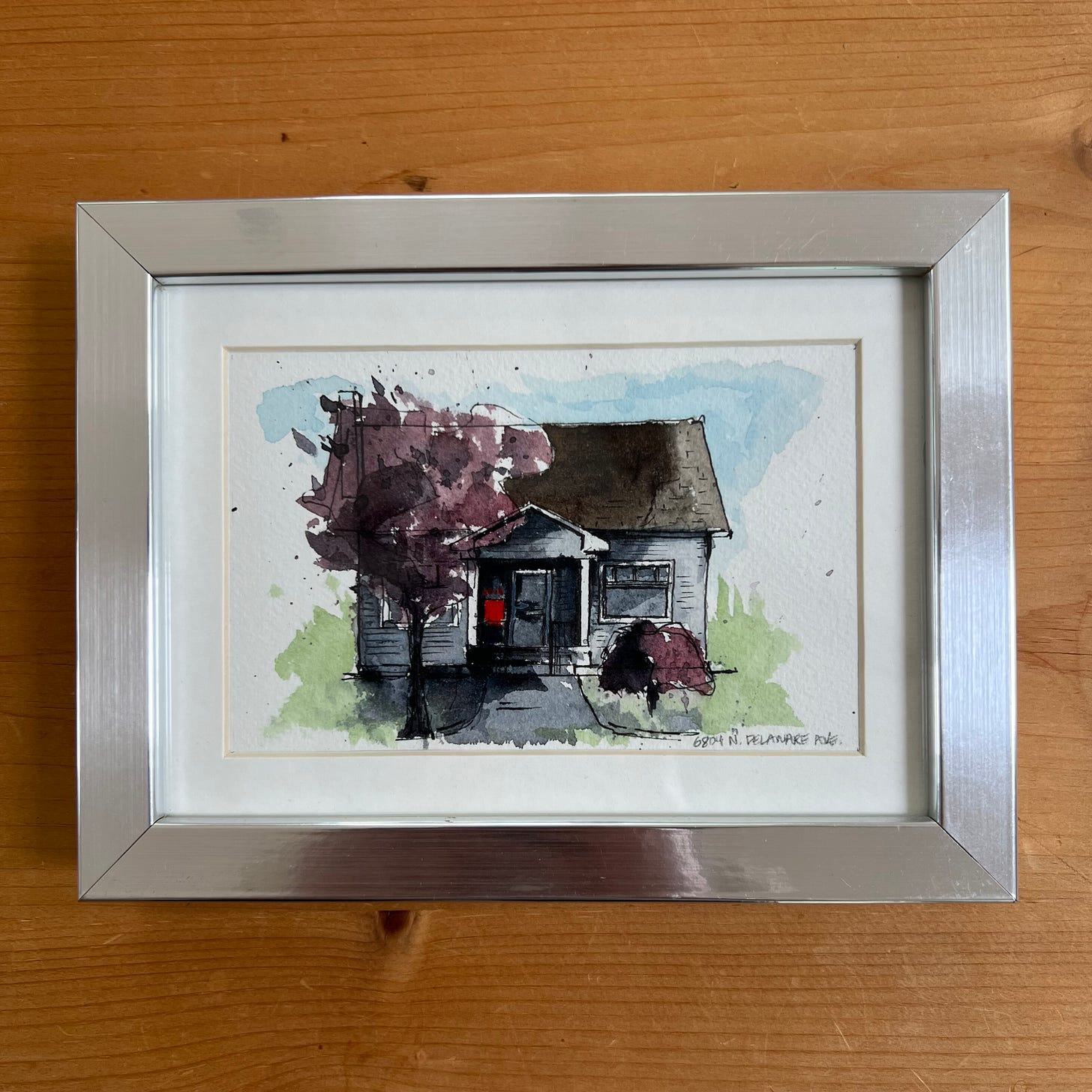
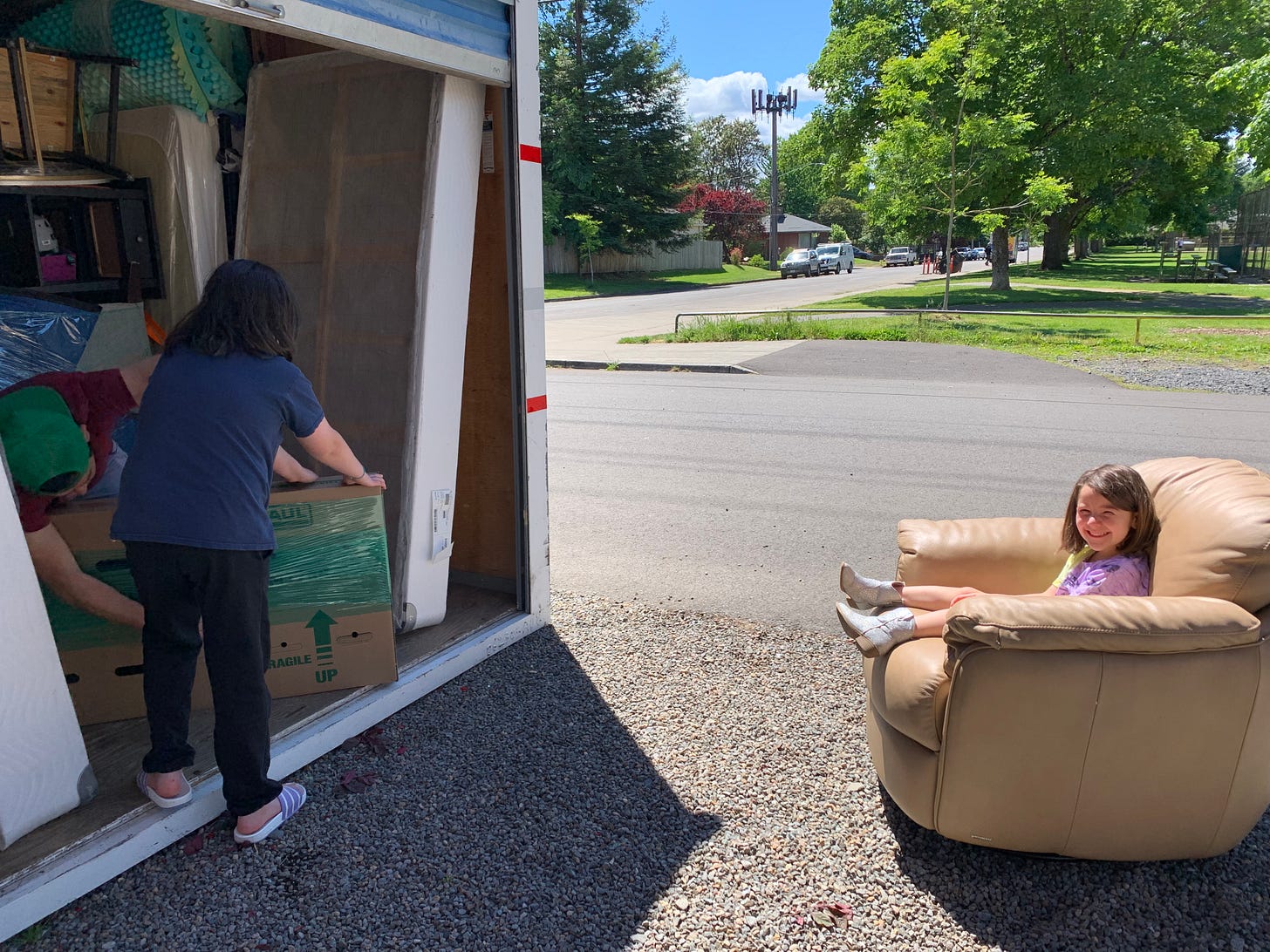
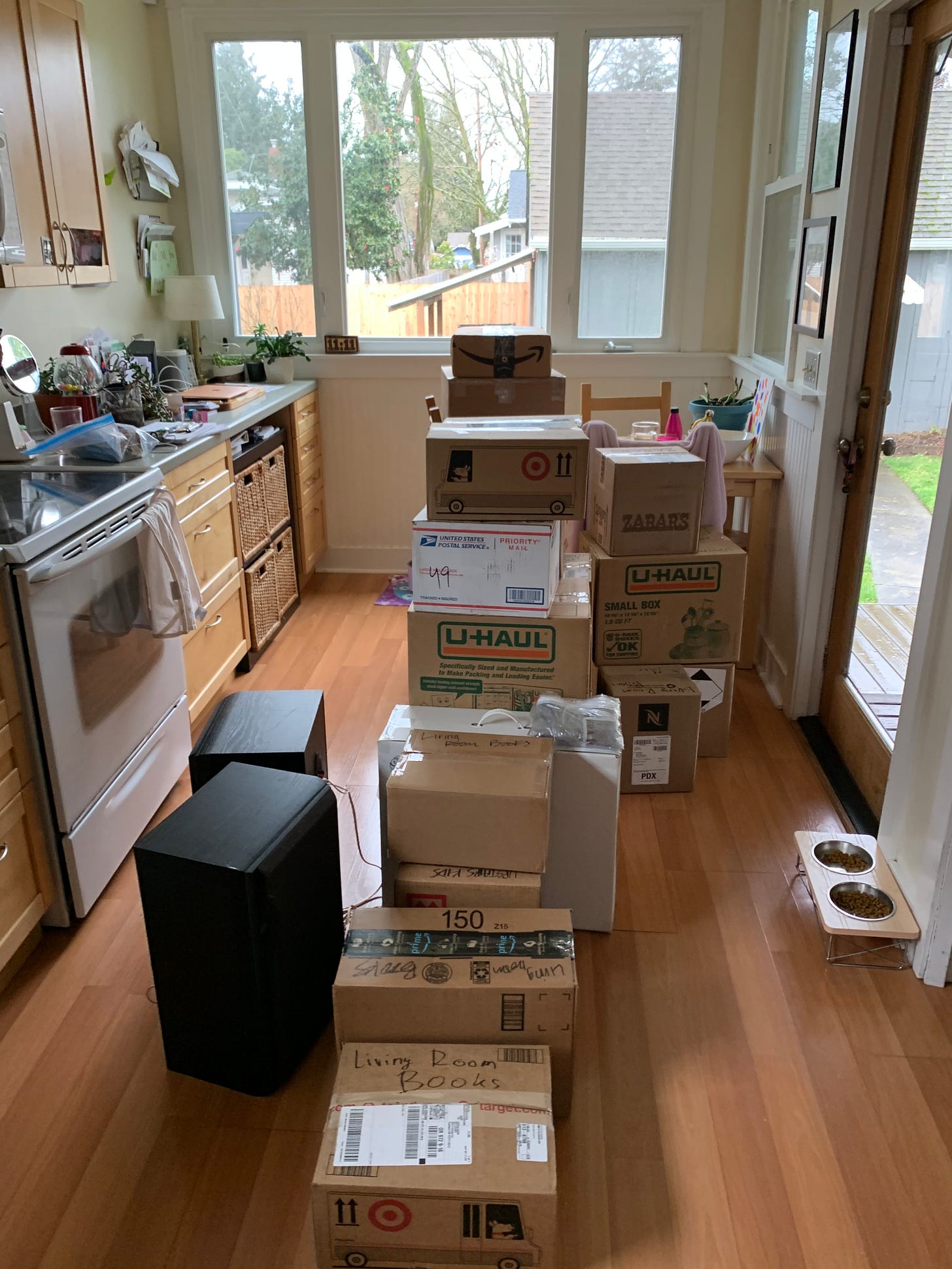
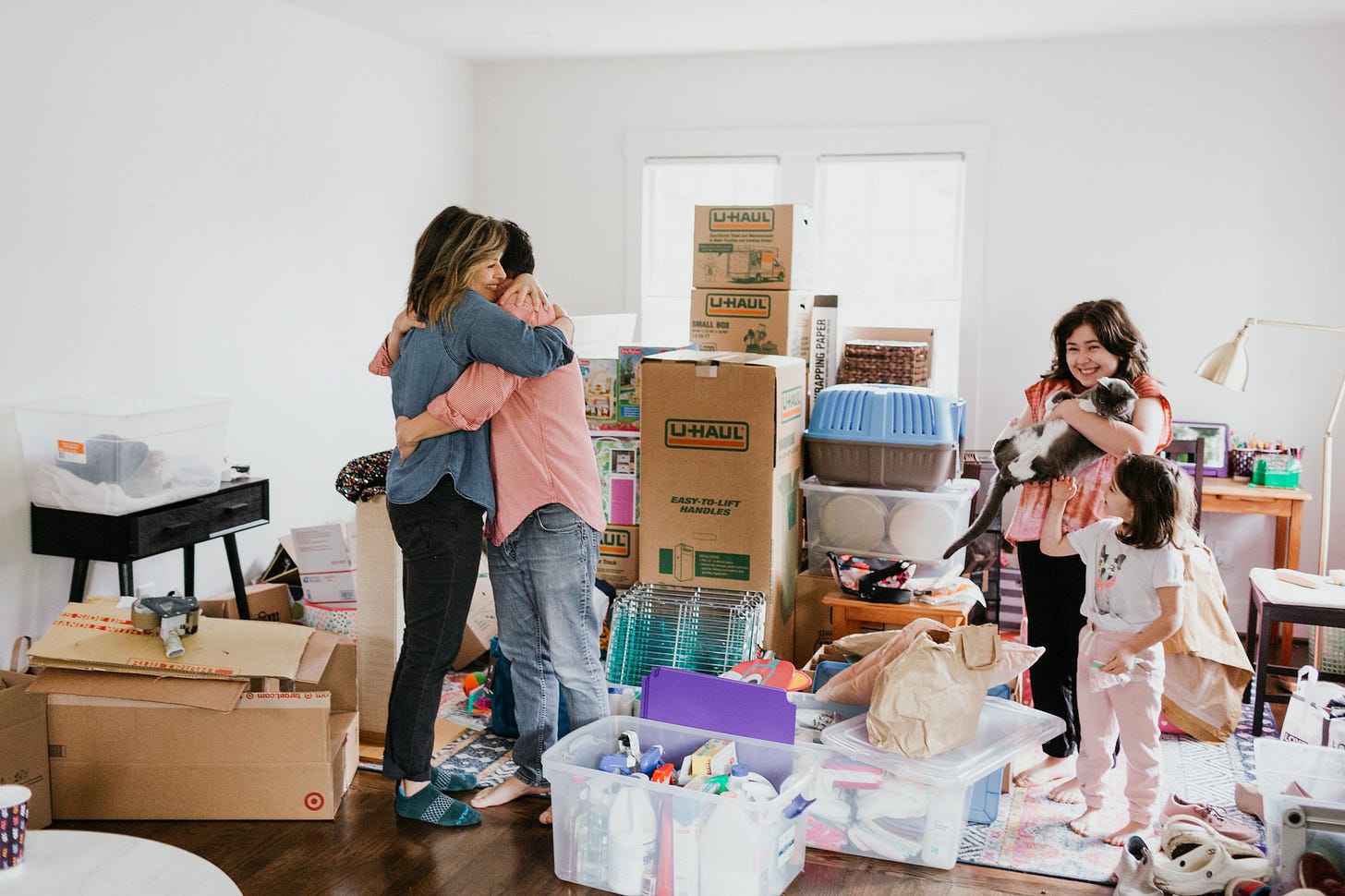
Absolutely bowled me over, per usual.
We never stop missing you, pal.